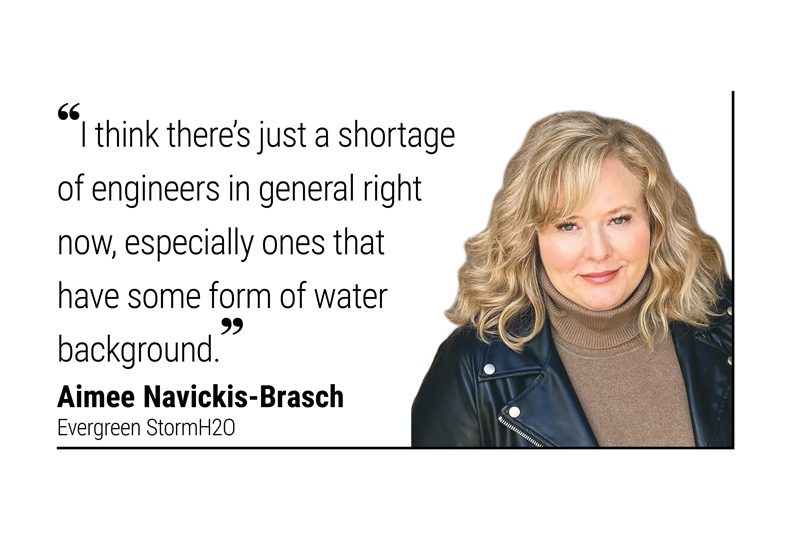
Home » Engineering workforce tightens as demand climbs in Spokane area
Engineering workforce tightens as demand climbs in Spokane area
Some companies poised for growth; expansions are limited by staff shortages

May 9, 2024
Aimee Navickis-Brasch, principal and co-owner of Spokane-based Evergreen StormH2O, says there's a noticeable engineer shortage across all engineering specialties in the Spokane region.
"I think there's just a shortage of engineers in general right now, especially ones that have some form of water background," says Navickis-Brasch.
Evergreen isn't the only engineering concern in the Spokane-area facing labor challenges.
In Liberty Lake, another engineering company, Hungry Horse Engineering LLC, which does business as H2E, is poised for growth and expansion, yet it has been unable to take advantage of the current strong demand to grow and expand the business, says CEO Neil Heckerman.
"Globally, there is a shortage of engineers and within the U.S., there's not enough students in engineering programs to meet the demand," he says.
Navickis-Brasch, who also is a longtime adjunct professor of civil engineering at Gonzaga University, concurs.
Evergreen StormH2O's clients call on the company to help with complex projects that need the niche technical skills that stormwater engineers with advanced degrees have, but students either are being drawn to other engineering specialties outside of the stormwater and environmental fields, or they're leaving the Spokane region for job opportunities elsewhere, she says.
"My class this year had about 18 students ... and fewer are staying here," she says. "It's pretty common for the younger students in particular to want to go to a bigger city."
At H2E, Heckerman says the company has started targeting a younger demographic for future employment prospects.
"We're having to go down to the sophomore year ... and offer summer internships and help them through their senior year, just to get people hired because they're in such demand," Heckerman says. "It is very difficult to recruit."
H2E specializes in industrial engineering for government and commercial clients involved in the mining, cement, power generation, carbon capture, and water and wastewater industries.
H2E has 50 full-time employees and room to accommodate an expanded workforce at its facilities located at 23305 E. Knox, in Liberty Lake, and another office in Helena, Montana, .
"I think the key limiting factor is just resource constraints. Finding talent is really the limit," says Heckerman. "If we add 10 more engineers, there's plenty of work to keep those 10 people busy."
At Evergreen StormH2O, the trade name of Spokane-based NB Engineering LLC, the engineering concern has a staff of 12, including 10 full-time employees, who are busy year-round providing planning and permit compliance support, design, and research services, she says.
The company's employees all work remotely in Spokane and a other cities in Western Washington.
Navickis-Brasch holds a doctorate in applied stormwater research from the University of Idaho and has seen many industry changes during her 30-year civil and environmental engineering career including a growing need for engineers with advanced degrees.
"It's definitely more complicated and takes a lot more to develop projects," she says. "Earlier in my career, a Ph.D. didn't seem like it was necessary, but now, it's helped us tremendously on some of our complicated projects."
For Evergreen, another industry change involves stormwater management as a major priority for clients, who are mostly municipalities across Washington state, she says.
"There's big demand for the services we provide," says Navickis-Brasch. "Stormwater used to always be part of a bigger project, and now 75% of our projects focus (on stormwater) as the whole project."
Evergreen's work involves more than designing drainage systems and pump stations, it also involves research, consulting, and funding for its clients.
Additionally, "we will get involved to help our clients figure out how they're going to meet permit requirements," Navickis-Brasch says, referring to National Pollutant Discharge Elimination System permits, issued by the U.S. Department of Ecology. The NPDES is essentially a license for entities to discharge pollutants if the substances are regulated and monitored for the quantity and concentration flowing into waterways.
Evergreen currently is working on several major projects, including bioretention soil media research at Gonzaga University's campus and the development of a street sweeping guidance manual in partnership with the Washington state Department of Ecology and the Washington Stormwater Center.
"It's guidance specifically related to stormwater benefits. It's picking up pollutants off the street and also disposing of them," she explains, adding that the manual addresses the disposal process, where to dispose of collected substances, and how much of the contaminated materials can be expected to be removed from the environment through the process.
"Another one we're working on is developing Spokane County's stormwater comprehensive plan, which is helping them comply with their (NPDES) permit, as well as how to fund that work," says Navickis-Brasch.
At H2E, Heckerman declines to disclose the projects the company is involved in due to nondisclosure agreements with clients, but says the hydroelectric power generation sector is ramping up in the Pacific Northwest, and across the U.S. there's a growing movement to improve cement manufacturing to make it cleaner and more energy efficient.
Future expansion at H2E is eyed in Colorado and Arizona as soon as the company's workforce can support growth, Heckerman says.
Going forward, Heckerman says he expects new environmental regulations to continue to tighten emission controls across all industries, in addition to continued improvements for fish health in waterways controlled by dams for hydroelectric power generation.
"It's really the march of contemporary societies. How do we make it safer and cleaner because we all have to live in the same world we produce in," he says.
In the meantime, Heckerman says H2E will continue cultivating a company culture that inspires collaboration and celebrates employee success.
At Evergreen, Navickis-Brasch says the company wants to expand its workforce and anticipates opening an office in Spokane, likely in the next few years.
"We hope to grow, but we're not trying to for the sake of growth," she says. "I'd like to see us expand around the state where we have staff in Bellingham, Spokane, Olympia, and the Seattle area, but we'll stay focused in Washington."
Latest News Special Report Real Estate & Construction
Related Articles
Related Products




![Brad head shot[1] web](https://www.spokanejournal.com/ext/resources/2025/03/10/thumb/Brad-Head-Shot[1]_web.jpg?1741642753)
